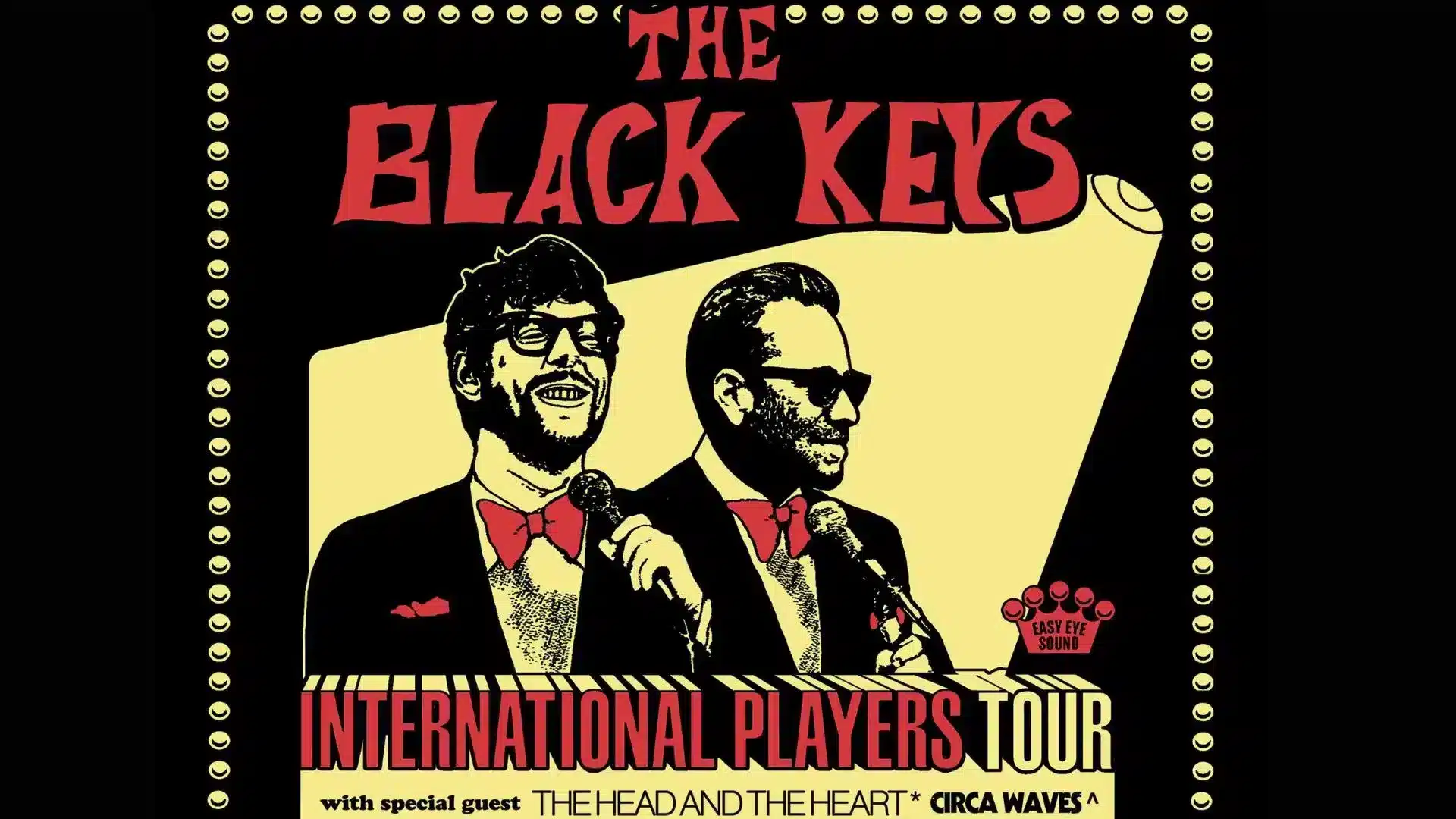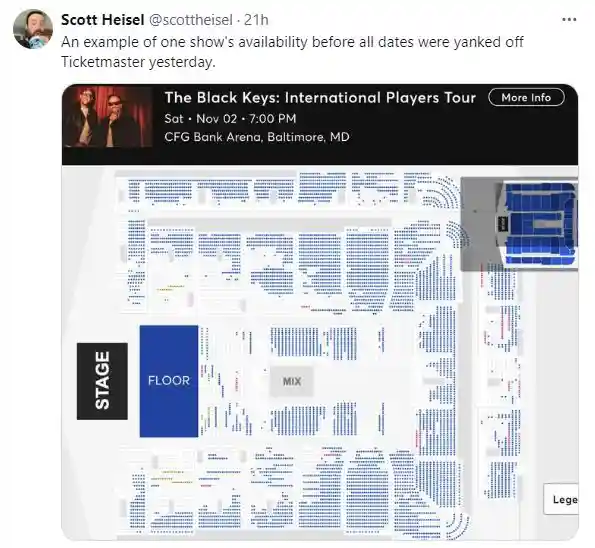
The Black Keys international players tour
The Black Keys Cancel 30+ Dates; is “Slow Ticketing” Killing Tours
The Black Keys have cancelled the entire North American leg of their International Players Tour, originally set to run this fall at arenas. No reason was given for the cancellation. The tour, which also included a just-completed European run, was set to begin in September at BOK Arena in Tulsa and conclude with a November 12 date at Little Caesars Arena in Detroit, with a total of 31 performances.
“The band wants to assure everyone that Dan & Patrick are alive and well,” reads a post on X from the group over the weekend. “We have decided to make some changes to the North American leg of the International Players Tour that will enable us to offer a similarly exciting, intimate experience for both fans and the band, and will be announcing a revised set of dates shortly.”
For several days after the run was cancelled, no official reason was given for the cancellation, leading to online speculation that the event was another victim of the aggressively high pricing that promoters and artists have been pursuing in the post-COVID touring scene.
“The Black Keys just canceled their entire North American arena tour for this fall due to extremely poor sales (likely due to exorbitantly priced tickets – most markets were $100+ just to get in the building,” wrote user @scottheisel on X. “Whoever thought booking this band in arenas in 2024 should be fired.”
Below that, Heisel attached a screenshot of the seat map at Baltimore’s CFG Bank Arena, showing a massive percentage of the seats unsold, indicating that it was taken on Friday before the tour cancellation was announced.

“This has created a discussion about how The Black Keys should play at smaller venues, but it should be more about ticket prices,” wrote user @JasonQuigs on X, quoting Heisel’s original post. “Why are nosebleed seats to anything $100+?”
That discussion has also been active on Reddit, where a thread discussing the tour cancellation reached the top of the popular r/music board Saturday. Many fans chimed in saying they were immediately turned off from the idea of purchasing when the tour went on sale two months ago because of the outrageous ticket prices.
“110 nosebleeds… That’s all I have to say,” wrote one user.
“That’s why I didn’t get tickets. Opened up the pre-sale, laughed at the ridiculous prices and felt just fine about not seeing the black keys,” wrote another in response. “I would’ve felt just fine about paying $50 to see them in a club setting, theatre or amphitheater. >$100 to watch a couple ants play is a hard pass.”
Other comments chimed in with further frustration regarding the ridiculous ticket pricing that they have been seeing for live shows in this era.
“People are just tired of paying $250 to see a band, plus transportation , $15 beers all night, $100 dinner + and $70 t-shirts …,” wrote one.
“Ticket prices are really crushing edge level bands,” one reddit user pointed out. “People used to be able to take a flyer on a band that has/had some notoriety when tickets were $50-$75, now they save up and go to the big names, if at all.”
The escalating ticket prices are one of the major headline stories of 2024 in live music, as they have been for several years. Consumers are being crushed by the asking prices for shows – largely willing to swallow the cost for the biggest of performers like Taylor Swift and Beyonce, but thinking twice for everyone else.
Billie Eilish’s recent tour saw significant fan backlash when tickets went on sale, and fans were encountered with “cheap seats” starting at no less than $100, and almost none of those available. Most tickets started at a minimum of $200 after fees, even though the tour was marketed as taking a fans-first approach by locking out ticket resale except in states where such restrictions are against the law.
FURTHER READING | Concert Ticket Pricing Surge Fueled by Artists, Promoters
What Is Slow Ticketing?
Fans seeking to find the source of the ticket pricing mess can trace it back in large part to Taylor Swift and her embracing of the “slow ticketing” system envisioned by Ticketmaster head of music David Marcus.
In this system, prices are set at what the tour organizers (and its partners at companies like Ticketmaster) believe is the highest level that the artist’s fans might be willing to pay, for each level of seating (even down to individual rows, with premiums for things like aisle seats). It also encourages the use of pre-registration, through things like the hated “verified fan” system, so that event operators know the kind of demand for every date on a tour and can price accordingly – as well as feed into their “dynamic” pricing systems that will adjust prices during peak sales periods.
What happens is that the initial rush of ticket sales (where superfans who MUST attend the show are shopping) then charges peak prices. Theoretically, it would involve ticket prices going down later on, in order to fill in the rest of the unsold seats at prices where the non-superfans are willing to pay.
“We’d like to sell the last ticket to her concert when she takes the stage each night,” Marcus told Billboard in 2017. “We’re not trying to sell all of her tickets in one minute; we’re trying to figure out how to sell tickets in a more modern way.”
While fans fumed back in 2017 over the then-outrageous $800 “snake pit” tickets and $1,500 VIP passes to Swift’s Reputation Tour, Marcus and other industry insiders congratulated each other on the fact that they were able to charge such prices, which they claimed was an effort to cut out “bots” and “scalpers” – in effect because they were charging everyone in the building the price that they thought a scalper might try to get.
“Change is not easy,” WME head of music Marc Geiger told Billboard, brushing aside fan criticism of the pricing strategy. “The idea that a consumer is going to sit in first class with an economy ticket is a holdover from what I used to call ‘rock and roll socialist pricing.”
High prices on Ticketmaster are just “a different thing to complain about,” he says, “We are slowly moving towards hopefully a market economy. And if people don’t like the price of one ticket, then they can either buy a cheaper ticket or not go to the show.”
FURTHER READING | Taylor Swift and the Myth of “Slow Ticketing”
Slow ticketing is also reinforced by a number of tricks pulled by promoters and primary ticketing companies – who will regularly hide unsold tickets from view (holdbacks), deceptively implying that an event is sold out when the reality is far from that. Often, even high profile tours using this strategy need to slash prices at the last minute – as Swift did for many dates on Reputation – or even employ things like price floors to keep tickets listed for resale by fans who can’t go from being priced less than remaining unsold box office tickets.
FURTHER READING | Arena Audit Shows Holdbacks, Not “Bots” or Brokers to Blame for Ticket Prices
Slow ticketing has arguably been the major factor in Live Nation Entertainment’s string of record-shattering earnings reports in the post-COVID era. While the giant has continued to grow through acquiring competitors and putting others out of business (running afoul of the Department of Justice along the way), it has supercharged its profits by selling more tickets at super-premium prices.
Has the practice run its course? Fans seem to be tired of ticket prices, but artists continue to appear willing to risk the fan blowback and potential to need to either postpone or cancel shows entirely when sales are poor in exchange for the higher potential revenue slow ticketing strategies mean. For The Black Keys, the PR hit is a bad one, but they can theoretically always do what their fans appear to be begging them to do: return to smaller venues.





